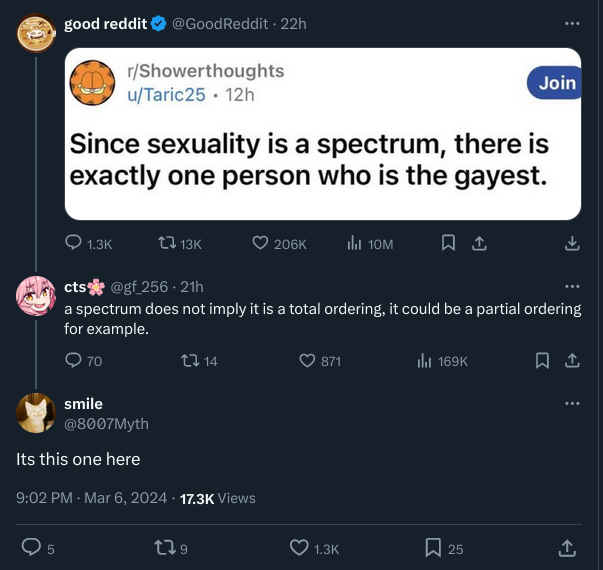this post was submitted on 27 May 2024
979 points (100.0% liked)
196
16490 readers
3211 users here now
Be sure to follow the rule before you head out.
Rule: You must post before you leave.
founded 1 year ago
MODERATORS
you are viewing a single comment's thread
view the rest of the comments
view the rest of the comments

Comment sections like this make me feel like I'm in a room full of crazy people, and or I eventually start to question my own sanity.
I mean sure, a spectrum is defined by at least 2 most extreme points (depending on the amount of dimensions). But like, what's stopping us form mapping two or more people to either extreme? Why can't 2 people be equally most gay or equally least gay?
Number theory suggests that by whatever metric it's determined, there's bound to be an infinitesimal difference between two measurements. Observation leads to significant figures, not reality
Well that depends on if gayness is a continuous or discrete quantity. If gay comes in very small but distinct indivisible units, the minimum could certainly be just 1 of these units.
Still, the upper range is likely to be unbound.
Planck gayness.
Avogaybros constant
I don't think there's such a thing as a discrete gay.. number and the sofar unmentioned bi spectrum implies a distributed or Cartesian system of expression
Considering bisexuality and demi sexuality I suspect that attraction is what we are measuring, not just gayness. Perhaps even attraction along two dimensions - romantic and sexual. This has interesting implications considering that gender itself exists as a spectrum with multiple dimensions of its own, at very least expression and identity, perhaps sex should be incorporated too which further complicates matters...
Nonetheless, I don't believe that any of this precludes our units of attraction from being discrete... I will concede that it's probably more likely, if there is some kind of fundamental attraction particle, that it has comparable properties to the photon.
I'm considering that each of these attraction particles (furthermore referred to as attractons) exists as excitations in the gender/sexuality field. Thanks to wave particle duality we can have a quanta of attraction with continuous possible amounts of attraction associated with each - just like the photon's variable energy.
You're also not accounting for the principle of uncertainty with bi and homo curious and the collapsing of the gay wave function
It's the quantum gay that we really have to measure, but I can't pin its velocity for some reason.
The Kinsley Scale is well defined. https://kinseyinstitute.org/research/publications/kinsey-scale.php
So is the Likert, but I bet you anyone trying hard enough can get gayer.
I am 250 units gay
I appreciate the quantification.